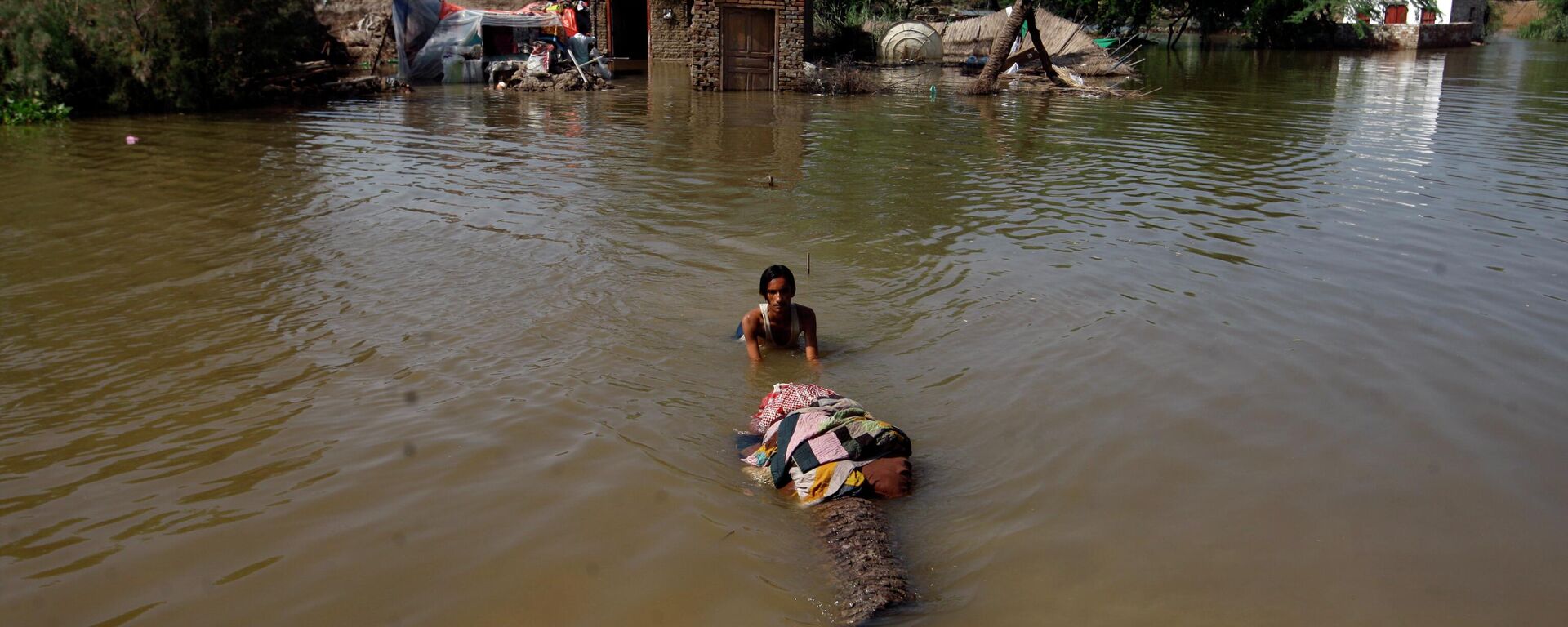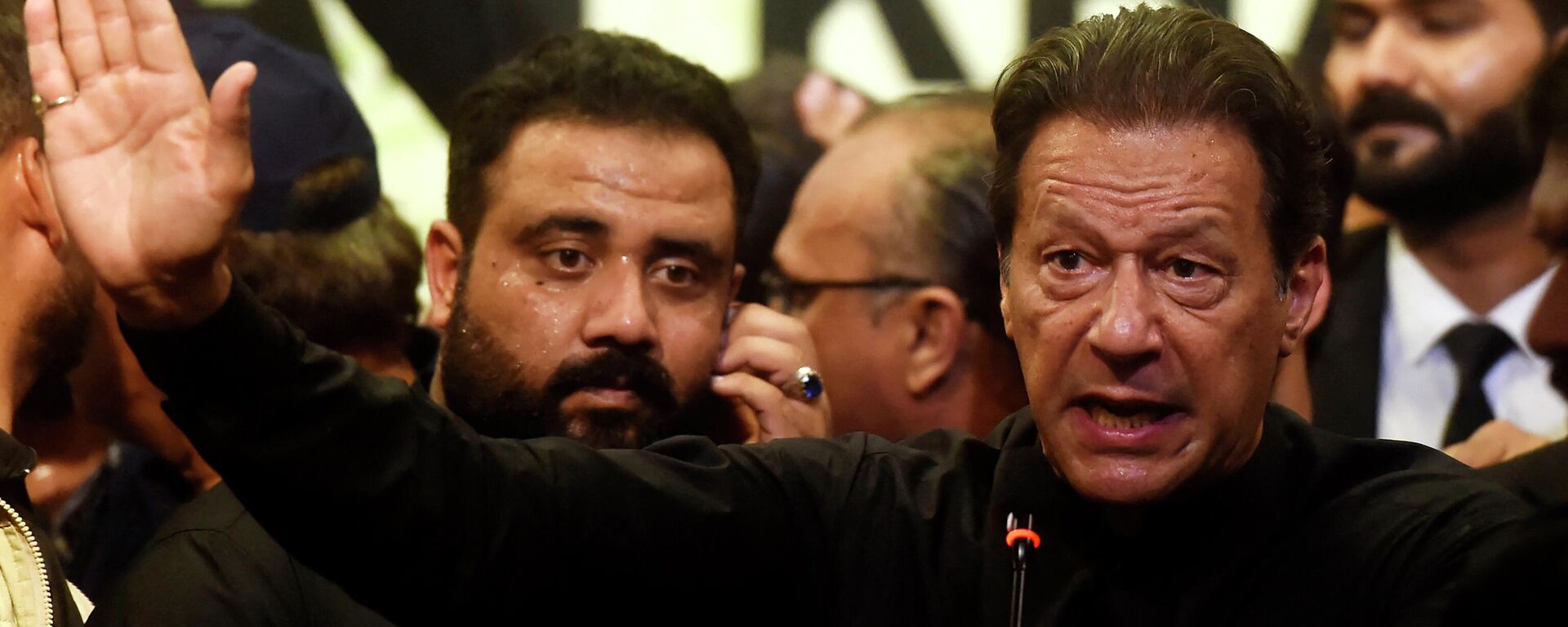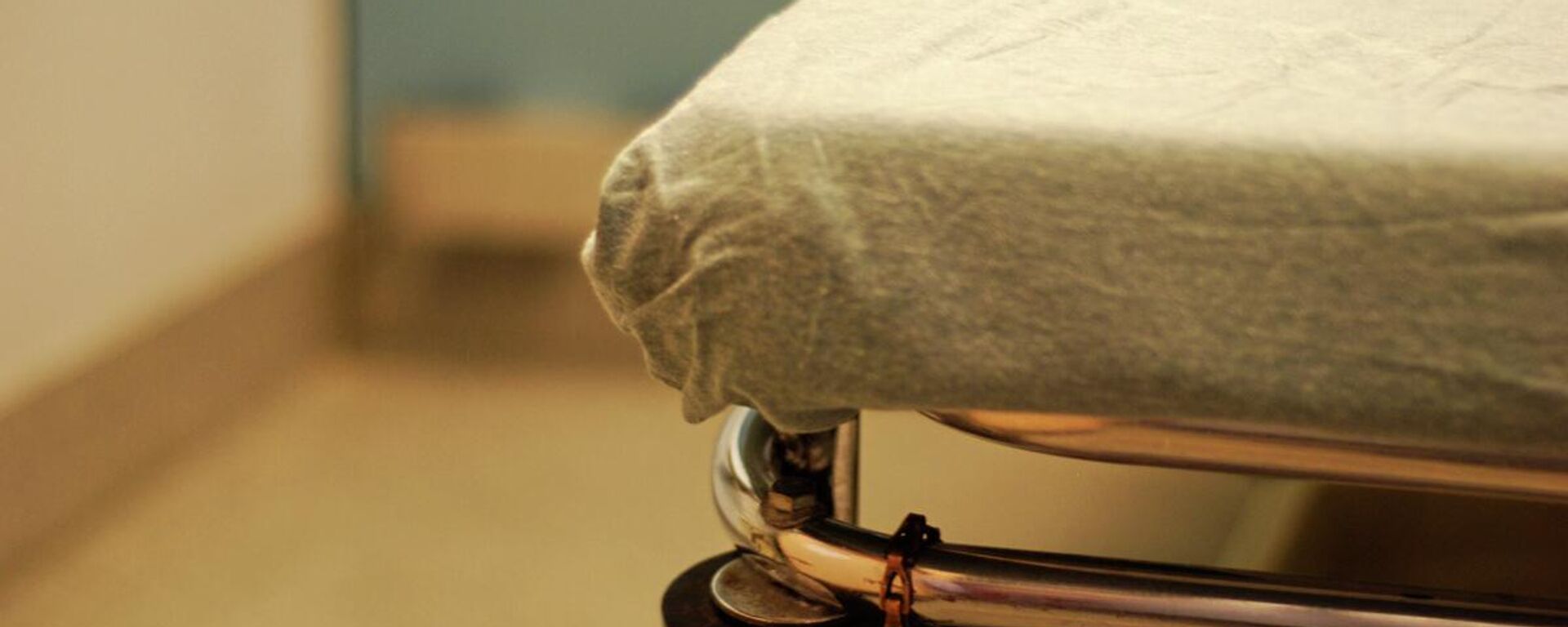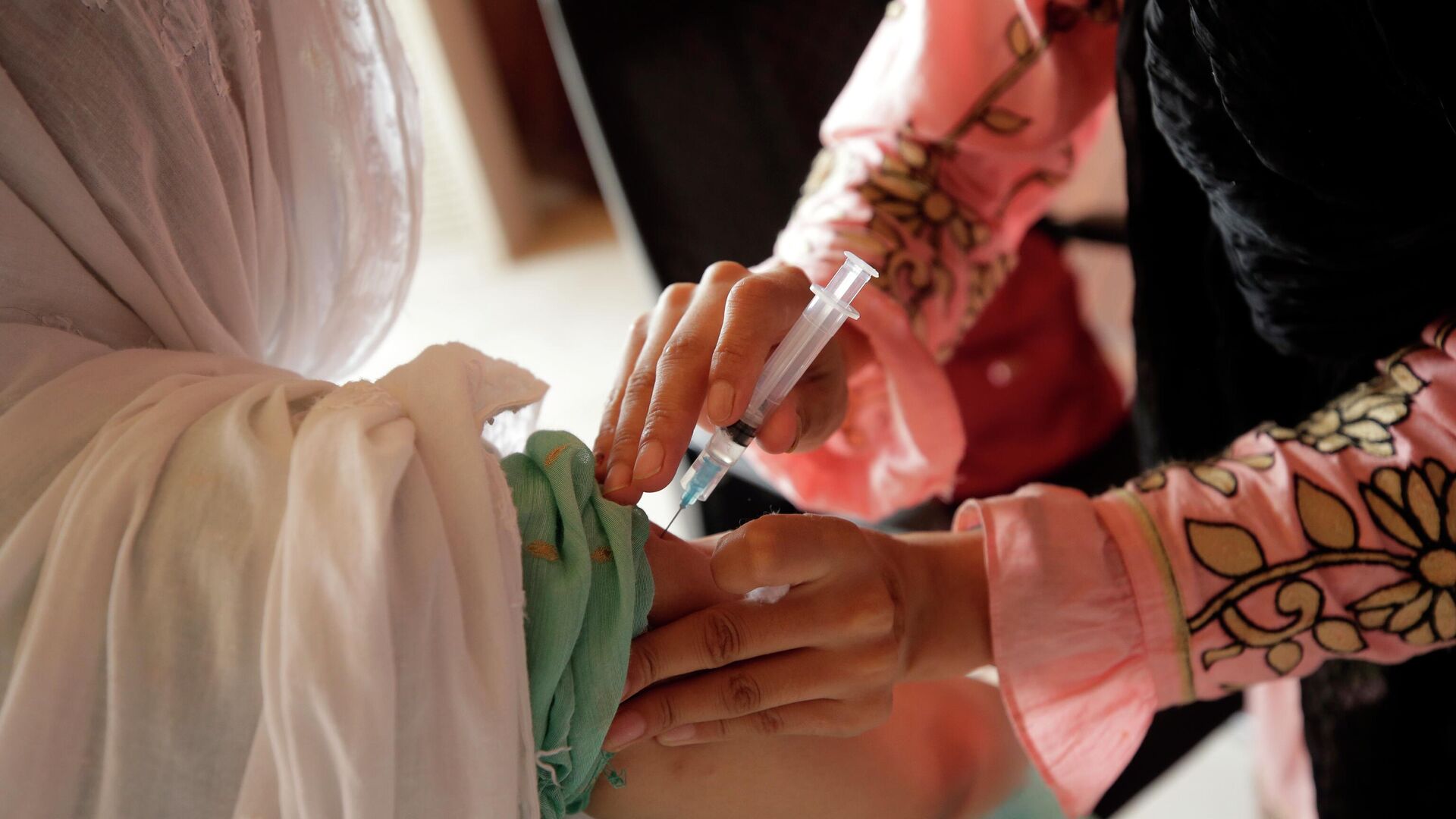https://sputnikglobe.com/20221019/magic-amulets--horse-steroids-fake-doctors-wreak-havoc-on-patients-in-pakistan-1102079246.html
'Magic Amulets' & 'Horse Steroids': Fake Doctors Wreak Havoc on Patients in Pakistan
'Magic Amulets' & 'Horse Steroids': Fake Doctors Wreak Havoc on Patients in Pakistan
Sputnik International
Despite many progressive steps toward a quality universal health care system, Pakistan's medical sphere is marked by dramatic flaws. Both rural and urban areas... 19.10.2022, Sputnik International
2022-10-19T21:14+0000
2022-10-19T21:14+0000
2022-12-08T18:02+0000
world
health
socio-economic
public awareness
education
pakistan
https://cdn1.img.sputnikglobe.com/img/07e6/0a/13/1102084617_0:160:3073:1888_1920x0_80_0_0_18585d082b1c1a575b168f9e8fcf2773.jpg
Health care in Pakistan includes both private and public sectors, with approximately 70% of the population opting for private health care. For decades now, private hospitals and facilities have been considered better than state ones both in terms of the overall quality of health care and patients' recovery.According to a report by the Borgen Project, a rise in the number of medical universities and a high number of annual graduates from public and private medical colleges has improved the health system within the country. There have also been substantial investments in campus buildings and hospitals, which have also improved the situation.These days, even the most complicated surgeries such as liver, heart and bone marrow transplants are being carried out in hospitals across the country, mostly in big cities such as Karachi, Lahore, Peshawar and Islamabad.The fact is that a large portion of competent doctors choose to practice abroad due to low salaries, increased workload, lack of funding and the overall limitations of the medical structures in their home country. What's more, after graduating from medical colleges, female doctors in Pakistan tend to get married and stop practicing medicine due to family pressure.As a result, the doctor-to-population ratio in the country stands at one doctor for every 1,764 persons. While for adequate population coverage, Pakistan needs at least two doctors for every 1,000 persons, according to the report.Steps in the Right DirectionDuring his premiership, former PM Imran Khan announced new health care reforms in the country and allocated $300 million to pay for additional ventilators and other medical equipment during the COVID-19 pandemic.In November 2015, Khan launched a nationwide flagship program called the Sehat Card Scheme, which made every family eligible for treatment of up to 1 million PKR ($ 5, 650) annually, both in government and private hospitals.This card covers all hospitalizations related to chronic conditions such as coronary heart disease (angioplasty/bypass), diabetes mellitus, arthritis, certain cancers (hepatocellular carcinoma, breast cancer, colon cancer, leukemia) and chronic infections such as tuberculosis and viral hepatitis.Even though Imran Khan's PTI government was removed from office through a vote of no confidence this year, the current government has chosen to continue the Sehat Card Scheme.However, despite these success stories, there are still great challenges that Pakistan faces in its health system, especially in rural areas. Although the government has taken some steps toward universal health care, there are still wide gaps within the system that are being filled by quack doctors and fake clinics.Just in Punjab, the most populous province of Pakistan with over 110 million people, there are reportedly 70,000 to 80,000 completely unqualified medical practitioners. These also include pharmacists and homeopaths who pose as qualified doctors and charge patients for 'treating' them.Doctor Who?The term "quack" originates from quacksalver, or kwakzalver, a Dutch word for a seller of nostrums, medical cures of strange origins. So, a quack is basically a fraudulent or ignorant pretender claiming to have medical skills.Each year, fake doctors in Pakistan misdiagnose ailments, prescribe the wrong medication and give out advice that they are not qualified to give to millions of people.The country is also abundant with so-called 'faith healers' who use different religious methods including prayer, amulets and holy water to 'cure' serious and life-threatening diseases.More bizarrely, a large number of people are treated by 'experts' who allegedly practice and 'heal' through the use of black magic.The health and life of a patient seeking treatment from such a person, who lacks professional medical knowledge and skills, is in actual danger.There have been cases when a quack was busted and after his clinic was raided, police found copious amounts of vials of steroids that said: "Veterinary use only." These steroids designed for horses and cattle were being injected into clueless human patients.Moreover, careless prescription of antibiotics by such fraudulent doctors is helping to breed bacterial resistance to these antibiotics. Quacks also do not keep records and are unable to spot, much less report, outbreaks of infectious diseases.So, Why Do Pakistanis Go to Fake Doctors?First of all, quacks are cheaper than going to a qualified doctor or a hospital. A quack never asks for proper laboratory tests and blood samples, choosing to prescribe some 'medicine' of his own making instead.These frauds also tend to be quite friendly and know how to manipulate patients. They tend to give proper attention and show fake concern, whereas, in government hospitals, overworked doctors have little time to spare for each patient.However, the most important reason behind people's blind trust is the fact that the majority of the population is uneducated; they don't know any better.If a quack has opened a 'clinic' in a village, people start going to him in the hope of finding relief for their ailments. Through word of mouth, the popularity of such charlatans starts to rise and before you know it, the quack is 'treating' the whole village. No one bothers to ask for his qualifications because most of the rural population can't even read or write.According to some reports, there have been cases when a quack showed fake documents to patients pretending to be a qualified doctor but the documents in fact indicated that the doctor had taken a course in homeopathy or it was just a high school diploma.In a majority of cases, patients suffering from common health problems may benefit from the quack's treatment because he prescribes basic, over-the-counter medicines, thus reinforcing people's faith in the charlatan. However, if a person faces a complicated disease that's not treated, and the patient dies, the quack attributes it to Allah's will, instead of his medical negligence.According to a report by Dawn newspaper, 'quackery' in Pakistan is an actual criminal business, in which at times, real doctors and surgeons are also involved to make extra money. If a quack faces a complication while 'treating' a patient, he can refer him/her to his 'colleague' - a qualified doctor or a surgeon in return for a commission for the referral.Hence, the culture of quackery is deep-rooted in Pakistani society and cannot be eliminated unless the public is properly educated and an accessible health care system for all is put in place.What Could Be the Solution?According to the Punjab Healthcare Commission (PHC), there are a number of laws that need to be implemented to regulate the health care system through the registration and licensing of all types of health care establishments in the public as well as private sectors.The Punjab Healthcare Commission is trying to enforce professional standards in the province of Punjab and reportedly out of 70,000 unregistered health care providers found in the recent census, the commission has visited 41,000 and closed down 18,400, while another 9,700 had abandoned their practice.Moreover, the PHC proposed organizing public awareness campaigns to promote patients' rights and safety. Addressing the systemic issues of patients' unmet needs through health sector reforms is another important step in curbing illegal quacks' business.As it remains the responsibility of the State to ensure the provision of health care to all Pakistanis, the provincial governments should toughen the laws criminalizing such illegal practices and arrest and punish the quacks in full measure.
https://sputnikglobe.com/20220831/pakistan-expects-rise-in-diseases-across-country-after-heavy-floods-local-health-experts-1100220651.html
https://sputnikglobe.com/20221017/imran-khan-makes-political-gains-across-pakistan-gives-sharif-another-chance-to-hold-federal-vote-1101912318.html
https://sputnikglobe.com/20220902/woman-in-indias-noida-city-dies-after-ivf-treatment-from-fake-doctor-1100313652.html
pakistan
Sputnik International
feedback@sputniknews.com
+74956456601
MIA „Rossiya Segodnya“
2022
Aneela Rashid
https://cdn1.img.sputnikglobe.com/img/07e6/09/0e/1100768477_0:338:606:944_100x100_80_0_0_af078d1bbaf1e33c21f16169e9ed7a5f.jpg
Aneela Rashid
https://cdn1.img.sputnikglobe.com/img/07e6/09/0e/1100768477_0:338:606:944_100x100_80_0_0_af078d1bbaf1e33c21f16169e9ed7a5f.jpg
News
en_EN
Sputnik International
feedback@sputniknews.com
+74956456601
MIA „Rossiya Segodnya“
Sputnik International
feedback@sputniknews.com
+74956456601
MIA „Rossiya Segodnya“
Aneela Rashid
https://cdn1.img.sputnikglobe.com/img/07e6/09/0e/1100768477_0:338:606:944_100x100_80_0_0_af078d1bbaf1e33c21f16169e9ed7a5f.jpg
health, socio-economic, public awareness, education, pakistan
health, socio-economic, public awareness, education, pakistan
'Magic Amulets' & 'Horse Steroids': Fake Doctors Wreak Havoc on Patients in Pakistan
21:14 GMT 19.10.2022 (Updated: 18:02 GMT 08.12.2022) Despite many progressive steps toward a quality universal health care system, Pakistan's medical sphere is marked by dramatic flaws. Both rural and urban areas are facing a harsh reality: thousands of functioning fake clinics operated by charlatan doctors have put the public's health at risk, giving rise to a plethora of infectious diseases.
Health care in Pakistan includes both private and public sectors, with approximately 70% of the population opting for private health care.
For decades now, private hospitals and facilities have been considered better than state ones both in terms of the overall quality of health care and patients' recovery.
According to a
report by the Borgen Project, a rise in the number of medical universities and a high number of annual graduates from public and private medical colleges has improved the health system within the country. There have also been substantial investments in campus buildings and hospitals, which have also improved the situation.
These days, even the most complicated surgeries such as liver, heart and bone marrow transplants are being carried out in hospitals across the country, mostly in big cities such as Karachi, Lahore, Peshawar and Islamabad.
Reports estimate that there are about 175,000 licensed doctors working to keep the population healthy. However, for a country of over 230 million people, this number of doctors is not nearly enough.
The fact is that a large portion of competent doctors choose to practice abroad due to low salaries, increased workload, lack of funding and the overall limitations of the medical structures in their home country. What's more, after graduating from medical colleges, female doctors in Pakistan tend to get married and stop practicing medicine due to family pressure.

31 August 2022, 11:28 GMT
As a result, the doctor-to-population ratio in the country stands at one doctor for every 1,764 persons. While for adequate population coverage, Pakistan needs at least two doctors for every 1,000 persons, according to the report.
Steps in the Right Direction
During his premiership, former PM Imran Khan announced new health care reforms in the country and allocated $300 million to pay for additional ventilators and other medical equipment during the COVID-19 pandemic.
In November 2015, Khan launched a nationwide flagship program called the Sehat Card Scheme, which made every family eligible for treatment of up to 1 million PKR ($ 5, 650) annually, both in government and private hospitals.
This card covers all hospitalizations related to chronic conditions such as coronary heart disease (angioplasty/bypass), diabetes mellitus, arthritis, certain cancers (hepatocellular carcinoma, breast cancer, colon cancer, leukemia) and chronic infections such as tuberculosis and viral hepatitis.
The former premier said that poor families did not have protection against such diseases and suffered greatly if they got affected. "The health card would provide protection to 50% of the country’s population against disease," Khan was quoted as saying by the Dawn newspaper.
Even though Imran Khan's PTI government was removed from office through a vote of no confidence this year, the current government has chosen to continue the Sehat Card Scheme.

17 October 2022, 06:36 GMT
However, despite these success stories, there are still great challenges that Pakistan faces in its health system, especially in rural areas. Although the government has taken some steps toward universal health care, there are still wide gaps within the system that are being filled by quack doctors and fake clinics.
According to estimates, there are over 600,000 quacks in Pakistan providing primary and basic healthcare to poor people in rural and urban areas of the country.
Just in Punjab, the most populous province of Pakistan with over 110 million people, there are reportedly 70,000 to 80,000 completely unqualified medical practitioners. These also include pharmacists and homeopaths who pose as qualified doctors and charge patients for 'treating' them.
The term "quack" originates from quacksalver, or kwakzalver, a Dutch word for a seller of nostrums, medical cures of strange origins. So, a quack is basically a fraudulent or ignorant pretender claiming to have medical skills.
Each year, fake doctors in Pakistan misdiagnose ailments, prescribe the wrong medication and give out advice that they are not qualified to give to millions of people.
These quacks not only pretend to provide treatment for minor health issues, such as coughs and colds, but also claim to specialize in cancer therapy, as well as liver and renal failure. At times, people go to them for treatment of infertility and impotence. Some charlatans even pretend to provide care to people with mental illnesses.
The country is also abundant with so-called 'faith healers' who use different religious methods including prayer, amulets and holy water to 'cure' serious and life-threatening diseases.
More bizarrely, a large number of people are treated by 'experts' who allegedly practice and 'heal' through the use of black magic.
The health and life of a patient seeking treatment from such a person, who lacks professional medical knowledge and skills, is in actual danger.
The exponential rise in HIV and hepatitis C cases across the country points to the fact that fake doctors indiscriminately reuse syringes and do not follow proper medical protocols, which results in the rampant spread of viruses and other infectious diseases.
There have been cases when a quack was busted and after his clinic was raided, police found copious amounts of vials of steroids that said: "Veterinary use only." These steroids designed for horses and cattle were being injected into clueless human patients.
Moreover, careless prescription of antibiotics by such fraudulent doctors is helping to breed bacterial resistance to these antibiotics. Quacks also do not keep records and are unable to spot, much less report, outbreaks of infectious diseases.
So, Why Do Pakistanis Go to Fake Doctors?
First of all, quacks are cheaper than going to a qualified doctor or a hospital. A quack never asks for proper laboratory tests and blood samples, choosing to prescribe some 'medicine' of his own making instead.
These frauds also tend to be quite friendly and know how to manipulate patients. They tend to give proper attention and show fake concern, whereas, in government hospitals, overworked doctors have little time to spare for each patient.
However, the most important reason behind people's blind trust is the fact that the majority of the population is uneducated; they don't know any better.
If a quack has opened a 'clinic' in a village, people start going to him in the hope of finding relief for their ailments. Through word of mouth, the popularity of such charlatans starts to rise and before you know it, the quack is 'treating' the whole village. No one bothers to ask for his qualifications because most of the rural population can't even read or write.

2 September 2022, 15:15 GMT
According to some reports, there have been cases when a quack showed fake documents to patients pretending to be a qualified doctor but the documents in fact indicated that the doctor had taken a course in homeopathy or it was just a high school diploma.
In a majority of cases, patients suffering from common health problems may benefit from the quack's treatment because he prescribes basic, over-the-counter medicines, thus reinforcing people's faith in the charlatan. However, if a person faces a complicated disease that's not treated, and the patient dies, the quack attributes it to Allah's will, instead of his medical negligence.
According to a report by Dawn newspaper, 'quackery' in Pakistan is an actual criminal business, in which at times, real doctors and surgeons are also involved to make extra money. If a quack faces a complication while 'treating' a patient, he can refer him/her to his 'colleague' - a qualified doctor or a surgeon in return for a commission for the referral.
"There are not only qualified and competent surgeons but even well-known diagnostic centers involved with these quacks and referrals. It’s an organized system that runs parallel to our health care system. A large number of qualified and unqualified health professionals are involved," the report explained.
Hence, the culture of quackery is deep-rooted in Pakistani society and cannot be eliminated unless the public is properly educated and an accessible health care system for all is put in place.
What Could Be the Solution?
According to the Punjab Healthcare Commission (PHC), there are a number of laws that need to be implemented to regulate the health care system through the registration and licensing of all types of health care establishments in the public as well as private sectors.
Another proposed measure to take was the setting up of an Anti-Quackery Cell within PHC for the coordination, implementation and enforcement of all Anti-Quackery activities.
The Punjab Healthcare Commission is trying to enforce professional standards in the province of Punjab and reportedly out of 70,000 unregistered health care providers found in the recent census, the commission has visited 41,000 and closed down 18,400, while another 9,700 had abandoned their practice.
Moreover, the PHC proposed organizing public awareness campaigns to promote patients' rights and safety. Addressing the systemic issues of patients' unmet needs through health sector reforms is another important step in curbing illegal quacks' business.
As it remains the responsibility of the State to ensure the provision of health care to all Pakistanis, the provincial governments should toughen the laws criminalizing such illegal practices and arrest and punish the quacks in full measure.






